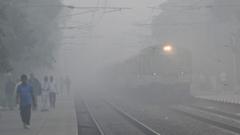Delhi’s air quality readings have alarmingly crossed the threshold of safe limits, indicating concentrations of PM2.5 and PM10 particulate matter well over 1,200. Such hazardous conditions have led to widespread complaints of respiratory illnesses, especially among high-risk groups like children and the elderly. Many are left reflecting on this annual struggle for clean air, reminiscent of a dystopian film that repeats itself with painful predictability.
The city's pollution crisis stems from various sources including vehicular emissions, construction dust, industrial waste, and seasonal crop burning in neighboring states. While efforts have been made to mitigate pollution, including government advisories to limit exposure and temporary bans on construction, long-term solutions remain elusive, with politicians often deflecting responsibility. The latest public health crisis does not catalyze mass protests as one might expect; instead, dissatisfaction is often confined to the digital realm.
Environmental activists and concerned citizens underscore that a meaningful resolution requires a collaborative approach from various governmental levels, focusing on systemic change rather than quick fixes. Despite the cynicism prompted by years of failed interventions, there are voices advocating for a united front against the recurring health crisis, emphasizing accountability from politicians and judicial authorities alike.
This winter, as the thick haze continues to engulf Delhi, the question remains: will this pattern of despair prompt the decisive action necessary to restore the city's blue skies, or will this cycle of negligence and despair play out once more?
The city's pollution crisis stems from various sources including vehicular emissions, construction dust, industrial waste, and seasonal crop burning in neighboring states. While efforts have been made to mitigate pollution, including government advisories to limit exposure and temporary bans on construction, long-term solutions remain elusive, with politicians often deflecting responsibility. The latest public health crisis does not catalyze mass protests as one might expect; instead, dissatisfaction is often confined to the digital realm.
Environmental activists and concerned citizens underscore that a meaningful resolution requires a collaborative approach from various governmental levels, focusing on systemic change rather than quick fixes. Despite the cynicism prompted by years of failed interventions, there are voices advocating for a united front against the recurring health crisis, emphasizing accountability from politicians and judicial authorities alike.
This winter, as the thick haze continues to engulf Delhi, the question remains: will this pattern of despair prompt the decisive action necessary to restore the city's blue skies, or will this cycle of negligence and despair play out once more?




















